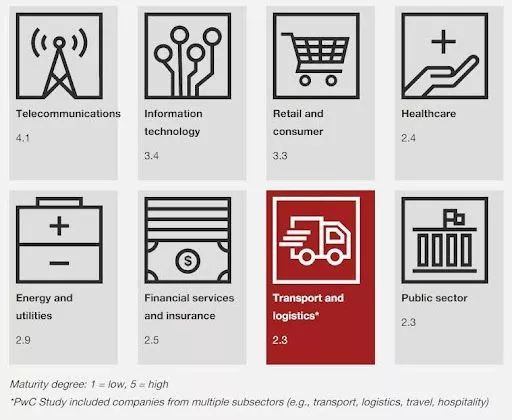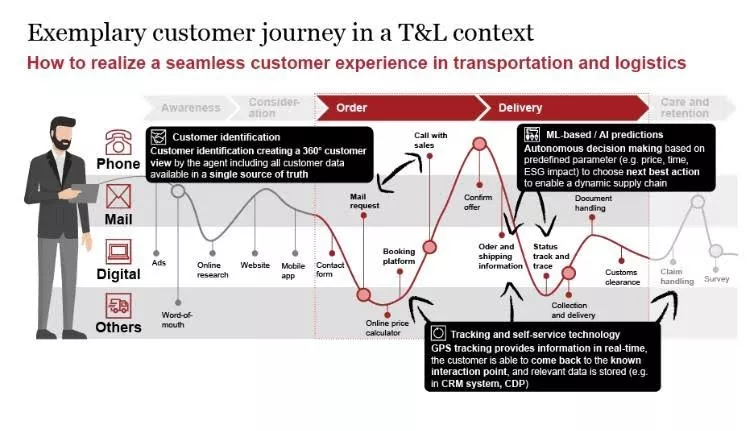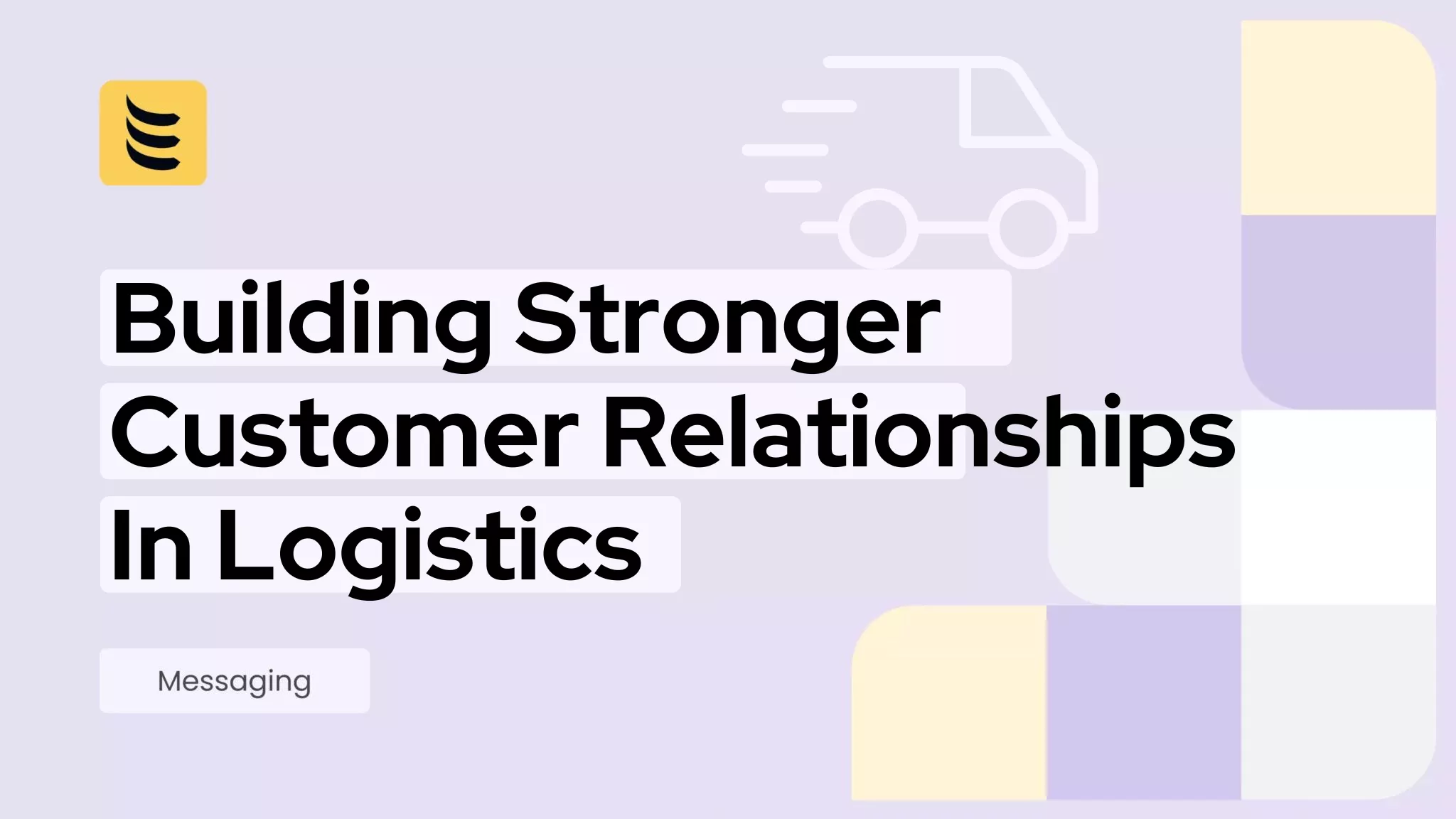The Importance of Customer Experience in Logistics Delivery
The Benchmark International 2024 Global Transportation & Logistics Industry Report reveals that the global freight & logistics market is expected to grow to $18.69 billion by 2026, at a compound annual growth rate (CAGR) of 4.4%. The global logistics market is anticipated to reach $6.55 trillion by 2027, growing at a CAGR of 4.7% between 2022 and 2027.
The freight & logistics market includes transportation, warehousing, management, delivery, consultation, packaging, and legal services, and enables companies in all sectors to store and transport resources such as equipment, inventory, food, and materials to their desired destinations.
Across all industries, the cost of acquiring new customers typically outweighs the investment needed to keep existing ones — often by a factor of five. This holds true for the logistics sector, where businesses that focus on building reliable relationships with their existing clients tend to thrive, in comparison to organizations that must continuously scramble to attract new customers.
In the logistics industry, ensuring that your customers have a smooth and satisfactory experience with their shipments is key. At an operational level, this requires you to streamline and optimize all critical processes. This runs the gamut from creating detailed profiles on prospective clients, to updating customer lists, to scheduling deliveries and appointments, to actively managing your communication with clients.
Companies that excel in customer experience management enjoy a range of benefits, including greater customer loyalty, positive recommendations, better market share, and higher profitability. However, research by PricewaterhouseCoopers (PwC) indicates that customer experience in the overall transport and travel sector (which includes freight & logistics) is less mature than in other industries, such as telecommunications, retail and consumer goods, and financial services.

[Image source: PricewaterhouseCoopers PwC]
PwC research further suggests that companies with a high level of customer experience maturity enjoy lower customer acquisition and retention costs — which can reduce their overall business costs by up to 25% . Organizations with higher CX maturity can also increase their revenue by 5 to 10%, due to their higher numbers of returning customers, and the ability to charge higher premiums.
For transport and logistics companies, delivering positive customer experiences encourages existing customers to increase their spending levels with the organization, and can generate higher customer satisfaction ratings, which attract new business. With a larger customer base, logistics organizations can gain access to more data from customers and partners in their supply chain ecosystem, which they can then use to tailor and refine their offerings and achieve greater operational efficiency.
Why Effective Communication Matters in the Logistics Industry
Good customer relationships in the logistics industry begin when potential customers reach out to your organization, receive quotes for the services they want, then sign up with you via a seamless onboarding process. Once you start working together, clients expect timely and efficient responses to their queries, exceptional operations, real-time problem solving, quick resolution to their complaints and claims, and efficient billing.
Strategy& (a PwC affiliate) advises logistics companies to put their emphasis on speed, self-service and multi-channel management, in order to ensure an exemplary customer journey.

[Image source: Strategy&]
Facilitating this ideal journey for your logistics clients involves many moving parts, and may incorporate multiple technologies. Effectively deploying the tech and keeping all stakeholders supplied with the information and resources they need requires coordination, with access to real-time intelligence, and the tools to make use of it.
A fully featured and multichannel communications solution can therefore contribute significantly to your efforts at building stronger relationships with your partners, stakeholders and logistics customers. For example, with IDT Express Omnichannel Messaging, you can streamline your customer support processes and ensure that your teams never miss important client dates, appointments, and deliveries, with a platform that ensures seamless messaging across diverse channels.
Effective Communication Strategies for Logistics Organizations
There are several communication strategies that you can use to nurture and improve relationships with your customers, optimize your internal operations, and enhance your interactions with supply chain partners and other stakeholders. They include the following:
Emphasize Speed and Real-Time Communication
Respond quickly and fully to each communication you receive. Provide real-time updates on the status of each shipment, estimated delivery times, and any potential delays. Proactively communicate any changes or issues which arise that may affect your customer’s order. Answer every query — even if you don’t have an immediate answer. The thing to do in this case is to explain what’s happening, and outline what you’re doing to find the right solution.
Fast and accurate communication is essential to good logistics customer service delivery. The more quickly and clearly you can deliver information, the quicker you can act — and that’s what customers want.
With IDT Express Omnichannel Messaging, you’ll have a comprehensive tool-kit for managing quick, accurate, and consistent communications. You can use notifications to keep your customers aware of important dates, times, or deliveries, and streamline your customer support processes by managing tickets and providing timely updates. With IDT Omnichannel, you can enhance customer engagement with intelligent ChatBots, to automate responses and handle routine queries. You can also set up automatic failover to ensure uninterrupted communication with your customers.
Provide Customized Solutions and Personalized Support
Each client will have their own unique logistics requirements. If you offer tailored solutions that meet specific client needs, this helps in nurturing good customer relationships. Understanding and addressing the individual challenges of each client demonstrates a commitment to their success. In turn, this promotes trust, and creates an atmosphere of cooperation and mutual benefit between you and your customers.
This approach extends to offering personalized customer support which addresses the individual needs and concerns of your clients. To this end, you should provide your support teams with the customer data and resources they need, and train them to provide knowledgeable assistance and empathetic responses.
With IDT Express Omnichannel Messaging, you can easily create personalized interactions with your clients, and enjoy reliable coverage across the globe, ensuring that your messages reach your audience, no matter where they are. Using IDT Express Omnichannel, you can also leverage a powerful Application Programming Interface (API) to seamlessly integrate your business communications with your Customer Relationship Management (CRM) and other customer-facing systems, to connect with your audience across a multitude of channels
Be Transparent
The strength of the entire supply chain hinges on transparency, and the ability to cooperate effectively with all key stakeholders. For this to happen, you need real-time data and communications tools that enable you to coordinate with your logistics partners and stay informed about all relevant changes and adjustments to orders.
You should also give your customers the avenues and information they’ll need to track their orders throughout the supply chain, from order placement to delivery. To promote transparency, give your clients timely and accurate feedback, reports, and invoices. You should provide these resources and information via the appropriate channels, tools, and languages that your customers prefer.
For example, with IDT Express Omnichannel Messaging, you can provide instantaneous updates and engage in rich and interactive conversations with your audience on the world’s most popular messaging apps. Using the IDT Express SMS platform, you can reach all mobile users instantly, ensuring delivery and engagement — and benefit from high open rates and personalized interactions.
Optimize Your Logistics Operations
Take a strategic approach to transportation modes and routes, and consider case-specific factors beyond speed and cost, such as safety and weather conditions. You can use security tools, predictive analytics, Internet of Things (IoT) monitoring and other technologies to take a proactive stance in addressing potential issues like damage or theft during transit.
Investing in advanced tracking systems can provide you with accurate and up-to-date information. Making this data available online or via mobile apps empowers your customers to keep an eye on what’s happening with their own shipments.
You can use on-demand packaging to save time and money, enhance security, and reduce damage and leakage with consignments. Consider bundling several orders together for shipment to a common location.
Internally, create mechanisms for your staff to continuously learn, in addition to your regular training programs for newly hired employees. Alongside the structured time set aside for becoming familiar with new technology or process changes, you can provide a forum for your employees to share updates, or trade solutions that might be helpful to the rest of the team.
For instance, using IDT Express Omnichannel Messaging, you can share multimedia content on WhatsApp, tap into Viber’s extensive user base for vibrant and multimedia-rich communication, or use Instagram Messenger integration to expand your reach to a visually-oriented audience.
Provide Avenues for Customer Feedback
You should regularly seek feedback from your clients, to help you identify areas where your services can improve. For example, you can conduct surveys, monitor social media, and encourage your customers to share their experiences. Listening to what your customers have to say and understanding their needs gives you the information and insights you need to tailor your logistics services to fit their expectations.
An omnichannel business communications solution can assist you in this. Using IDT Express SMS 2-Way Messaging for example, you can engage in interactive conversations with your audience and allow recipients to respond to your SMS messages, enabling a seamless communication loop. With IDT Express Omnichannel Messaging, you can reach a tech-savvy audience with Telegram (known for its security and feature-rich environment), to share updates and conduct interactive polls.
Put the Right Technology in Place
Logistics operators can now benefit from monitoring systems integrated with advanced technologies such as blockchain, augmented reality, artificial intelligence, and the Internet of Things. These systems offer real-time monitoring and information gathering, and enable predictive warehouse management, transportation, and delivery alerts.
Self-service kiosks at warehouses can reduce manual paperwork, while self-service technologies that allow real-time interaction can give clients greater supply chain visibility and knowledge about their consignments, on customer engagement platforms and apps.
Customers will expect to be able to contact you at their own convenience, and using their preferred methods of communication — be that email, phone, SMS, or via social media. So to nurture and sustain your customer relationships, you’ll need a communications system that can cater for all of these options.
IDT Express Omnichannel gives you the luxury of managing 15 different messaging apps all in one place, while empowering you to engage your logistics clients with timely and proactive communication.
To talk to one of our experts today, and see if we are a good fit for you — and to get $25 Free Test Credit with a Trial Account — visit our sign-up page.




